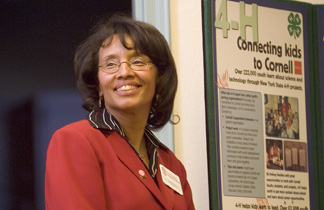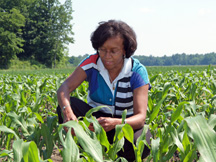Helene Dillard's passions are an extension of her love for nature
By Susan S. Lang

How does a little girl growing up in the big city of San Francisco develop an abiding love and appreciation for nature and a passion for biology? Go fish.
"My parents enjoyed fishing, and although my sister had no interest, I loved it," says Helene Dillard, director of Cornell Cooperative Extension (CCE), associate dean in the College of Human Ecology and the College of Agriculture and Life Sciences, and professor of plant pathology. "We would often go in search of new fishing spots around the San Francisco Bay, the central valley or the foothills."
Dillard's love for nature blossomed through these family trips by car; she was struck by the splendor of the natural environment that whizzed by outside the car and the beautiful wildlife around them as they fished. She was also intrigued by the diverse agricultural systems in the valley.
Dillard decided to major in the biology of natural resources at the University of California (UC)-Berkeley, with an emphasis in soil science. Although an outstanding course in plant pathology (taught by Professor Bob Raabe) fascinated her as an undergraduate, the thought of changing majors was too daunting.
But "plant rots, spots and wilts continued to call my name," she says. As she was finishing up her master's degree program in soil science at UC-Davis, a simple field trip changed everything. She sat next to plant pathologist Ray Grogan on the bus, who said he was looking for a graduate student with a background in soil science to work on an aggressive fungal disease of lettuce. The more he talked, the more exciting the research sounded; Dillard decided to shift her focus and has never looked back.
Her passion for Cooperative Extension developed in the Salinas Valley, the "salad bowl" of the United States, while working with farmers and extension specialists on solving the problem of lettuce drop, a disease caused by the fungus Sclerotinia minor.
"My research was relevant, addressing a pressing issue, and I needed to be able to communicate the outcomes of the research and usefulness of the findings to a fairly critical but highly engaged audience," she says, noting how much she enjoyed the experience.
When offered an assistant professorship at Cornell's New York State Agricultural Experiment Station in Geneva after finishing her Ph.D. in plant pathology, also at UC-Davis, she knew the job was perfect for her -- half extension and half research.

"The hardest part was moving with my husband, Victor, 2,500 miles away from family and friends in sunny, northern California to a place where people ice fish in the winter," she recalls.
Dillard's research and extension activities in the Geneva Department of Plant Pathology, which take about 20 percent of her time, focus on "rot," that is, the biology, ecology and sustainable management of fungal pathogens of vegetable crops. Project foci in her lab this year include the sustainable management of Sclerotinia sclerotiorum on snap and dry beans; tracking the migration of soybean rust (Phakopsora pachyrhizi) to New York state and monitoring this fungus on snap and dry beans; and quantitative epidemiology of Puccinia sorghi on sweet corn in the state.
Although her department chair and colleagues were excellent mentors and friends, Dillard says that the role model she kept watching from afar was Lucinda (Cindy) Noble, who was the director of Cornell Cooperative Extension for 15 years and is now retired.
"I admired her when she was the director, and I admire her even more now that I'm immersed in the complexities of the job," Dillard says.
Since 2002, 80 percent of Dillard's job has been as director of CCE, overseeing 1,700 employees around the state, including about 500 educators.
"When the Smith-Lever Act was signed in 1914, the idea was to deliver practical information from the land-grant universities to the people. In 2006, engaging the intellectual resources of the university to work on the issues facing the people in the state of New York is still at the core of what a contemporary extension system does," Dillard emphasizes. "We work in partnership with the people in this state -- it's a multi-lane, multi-directional educational highway."

Dillard says the CCE system, which has a local presence in every county of the state and an office in New York City, has a diverse portfolio of programs, some very focused at the county level and some statewide initiatives.
Despite the demands of the job, in good weather Dillard, her husband and 13-year-old son Jamar can be found fishing the streams in the Finger Lakes region and the Adirondacks.
"Though I love any kind of fishing, fly fishing is my favorite since it allows you to catch fish with more ease. I like to admire my catch and then throw it back in the water," she says. "I'm really pleased Jamar has developed a passion for fishing. We have been taking him fishing since he was a toddler -- he's now nearly 6 feet tall. He will fish in any kind of weather -- I'm a little more weather-selective."
Dillard's love for martial arts also helps to keep her life centered. While living in Geneva (she recently moved to Ithaca), Dillard joined the Geneva Martial Arts School and studied Tae Kwon Do. "I had studied Kenpo Karate as a high school student for a brief time, but I stopped my practice when I went to college. A friend suggested I try the free introductory lessons at the school here; I did and was totally hooked," says Dillard. She is now a third-degree black belt.
"I still have the first board I broke with my bare hands as a beginner -- but not to worry, the office furniture is safe."
Media Contact
Get Cornell news delivered right to your inbox.
Subscribe